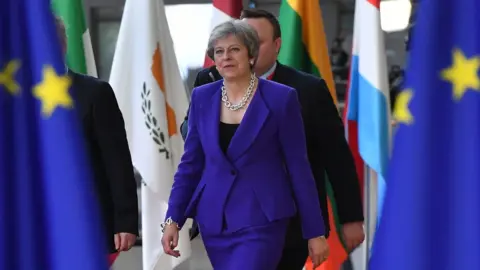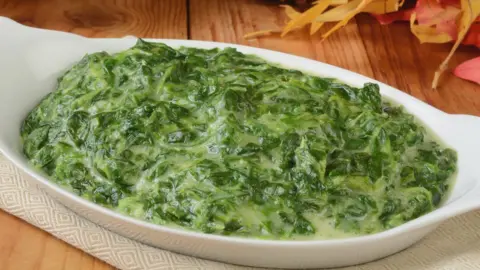Brexit EU summit: The week the talks got stuck in spinach
 Getty Images
Getty ImagesThe pavement cafes and bars were packed last Sunday as Brussels basked in an unseasonably warm weekend.
Among the drinkers were diplomats from the EU member states who had been kept in the dark ever since negotiators from the European Commission and UK had entered an intense and secret period of talks, jokingly known as "the tunnel".
"You can have a couple but not too many," advised one official close to the talks, hinting that movement was imminent.
After more than a week of radio silence, the rest of the European machine believed that a provisional agreement on the Brexit divorce treaty was just hours away.
The aperitifs were abandoned after the UK announced that Brexit Secretary Dominic Raab would be in Brussels for face-to-face talks with his opposite number Michel Barnier.
Ambassadors from the 27 other member states were told to prepare for an early-evening briefing. Diplomats said the mood music was good.
But British sources warned the situation was not as positive as it appeared and there were still serious outstanding issues, particularly with the so-called "backstop" - the back-up plan to avoid to a hard border on the island of Ireland that could see Northern Ireland staying in the EU's customs union.
Sunday: 18:43
A tweet from Michel Barnier changed the mood.
Allow X content?

Negotiations would be "paused" until EU leaders gathered for a Brexit-themed dinner on Wednesday. Both sides sounded seriously depressed.
The Politico website then claimed that officials had reached a deal at a technical level that "collapsed" when the Brexit Secretary became involved.
It made British civil servants desperate to prove that the prime minister's European adviser, Olly Robbins, had not drafted his own deal that had angered his political masters.
By Monday morning, Downing Street had coined a new phrase to explain the stumbling block: the "backstop to the backstop".
It was a way to rebrand the EU's insistence that Northern Ireland should stay in the customs union in the event no other solutions were found to avoid the need to reintroduce a border.
Theresa May reminded the House of Commons of her alternative of a UK-wide customs arrangement with the EU, which had been tabled in the summer as a "Temporary Customs Arrangement".
Previously described as a "bridge" between the post-Brexit transition (or "implementation") phase, it was now "our backstop".
Brussels noted with approval that the prime minister had talked about a process for deciding when it should come to an end instead of a date - a formula that was "event-driven" rather than time-specific.
It was also much closer to the phrase agreed with the EU that any backstop would be in place "unless and until" another solution is found.
And it would be legal for the EU to commit to during the Brexit process whereas a permanent customs solution was not, confirmed a European official who quoted the European treaties.
Meanwhile, it was suggested privately that the two sides had found a way to address the other half of the Irish border problem: keeping Northern Ireland aligned with the rules of the single market needed to avoid checks on the Irish border, but not necessarily avoiding them between Northern Ireland and Great Britain.
Theresa May also suggested that more progress had been made than people realised in the talks on the future relationship, including on financial services.
The day before EU leaders were to meet, Michel Barnier travelled to Luxembourg to update European affairs ministers.
He made a passing reference to the idea of extending the post-Brexit transition phase but gave few details. The UK seemed relaxed about the story despite the fact it would dominate the rest of the week.
Brussels summit: Day one
Then came the first of a three-day marathon of seven separate summits in Brussels.
Every EU leader spoke from the same script on Brexit: there was no decisive progress but they wanted to carry on talking.
"Do no harm and avoid anyone feeling offended when they leave," was the slogan.
Theresa May was given a 15-minute slot in which to make her case. A diplomat said she spoke so quickly it was as if she had a plane to catch.
The other leaders dined on pan-fried mushrooms, turbot and sorbet without the prime minister.
Inside the room Irish Taoiseach Leo Varadkar brandished a copy of an Irish newspaper, with a front page devoted to a murder during the Troubles to demonstrate Ireland's emotional case alongside its economic one.
Outside the room, European officials stuck to their concept of a Northern Ireland-only backstop but said they were prepared to "camouflage" it to make it as palatable as possible to the British.
 Getty Images
Getty ImagesOne compared it to a child being distracted from a bowl of spinach by filling the table with more appetising food.
A potential extension of the transition period was part of this effort.
It was a possibility that Mrs May was "cautiously" open to, an official confirmed. The president of the European Parliament, Antonio Tajani, said the same.
Dinner ended with the leaders saying there would be no planning for a Brexit summit in November, but leaving the door open to one if the negotiations made progress.
Talk of no deal - often perceived as a hostile act - was kept to a minimum.
Allow X content?

And officials reassured British journalists that a late-night drink featuring Angela Merkel, Emmanuel Macron and others - but not Theresa May - was a celebration of the Luxembourgish election results rather than a "screw you" to the UK.
"You guys are so paranoid," said an ambassador.
Disaster had been avoided but the transition proposal had created a domestic political nightmare for the prime minister.
Eating their greens
Downing Street was now trying to play the proposal down: "Just an idea…. it'll never be used."
Their focus was getting a legally binding reference to a UK-wide customs arrangement into the paperwork that would comprise the final Brexit deal, and they were exasperated that media coverage of the summit was dominated by the transition issue.
Then there was confusion when European Council President Donald Tusk said during a press conference that the 27 leaders had not discussed the concept, and yet European Commission President Jean-Claude Juncker said it would "probably" end up happening.
"Chaotic and un-coordinated" is the way one European diplomat described the Brexit component of the summit.
He blamed too little planning, a lack of precision from the European Commission and not enough co-ordination among the member states.
As the EU's multiple summits came to an end, Theresa May's fellow leaders suggested that the negotiations could not restart until the prime minister acknowledged that the Withdrawal Agreement had to contain an option for the backstop that might apply to Northern Ireland but not the rest of the UK.
The UK would also have to accept that its aspiration of truly friction-less trade could only be achieved by staying in the EU's customs union and sticking to the rules of the single market.
In other words: there are some tasty goodies on offer, but Britain will only be invited back to the table when it is prepared to eat its greens.
Listen to Adam Fleming and the rest of the BBC's Brexitcast team for the lowdown from Brussels and Westminster
